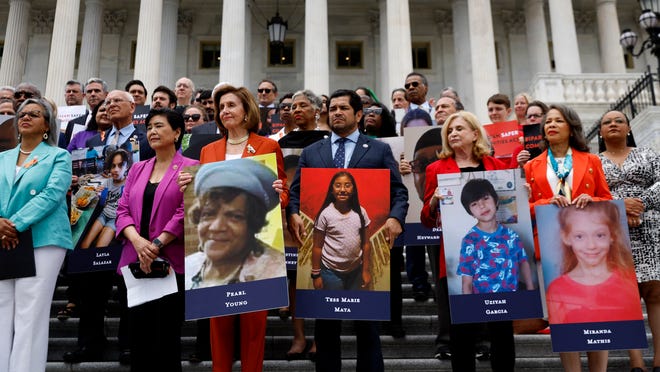- House GOP Leader Kevin McCarthy and Minority Whip Steve Scalise encouraged their members to vote no.
- A Republican congressman who represents Uvalde, Texas, voted for the gun deal.
- Democrats say they will continue to push for more reform, such as banning assault weapons.
WASHINGTON–The House approved a bipartisan gun deal Friday, all but cementing the biggest reform package passed by Congress in nearly 30 years.
Legislation first crafted and passed by the Senate now moves to President Joe Biden, who urged Congress Thursday to “finish the job” so he could sign it into law.
Unlike the Senate vote Thursday, when 15 Republicans joined Democrats to pass the gun deal, the House voted mostly along party lines.
House GOP Leader Kevin McCarthy and Minority Whip Steve Scalise encouraged their members to vote against the legislation after the conservative House Freedom Caucus asked them to whip against it.
29 Republicans voted for gun bill. Who are they?:Who are the 29 Republicans who voted in favor of the gun safety bill? And why?
House Democrats have a 220-210 margin and ultimately passed the gun deal 234-193. Fourteen Republicans voted in favor.
Rep. Tony Gonzales, a Republican who represents Uvalde, Texas, broke ranks with his party and voted in favor of the legislation.
Earlier in the week, he said it’s his “duty to pass laws that never infringe on the Constitution while protecting the lives of the innocent.”
The House debate on the gun bill came shortly after the U.S. Supreme Court’s watershed decision to overturn Roe v. Wade, rolling back five decades of legal abortions.
Time that was reserved for debate on the gun bill was at times used for comments on the historic ruling.
The SCOTUS decision:Supreme Court overturns Roe v. Wade, eliminating constitutional right to abortion
For example, Rep. Jerry Nadler, D-N.Y., said he found it difficult to not address it.
Nadler said the justices in their ruling indicated this was “just the beginning of a radical, right-wing effort to roll back other rights, including the right to contraception, the right to marry whomever we choose and the fundamental right to privacy.”
Congress has been under mounting pressure on several issues, but none more immediate than gun rights and abortion rights.
May mass shootings in Buffalo, New York, and Uvalde led to the cries of parents and loved ones begging Biden to “do something.”
The bipartisan Senate gun deal was their response – one that many Democrats say doesn’t go far enough while several Republican voters fear chips away at their gun rights.
‘Upset no matter what happens’:Senate gun deal leaves voters on both sides unsatisfied, frustrated
“While more is needed, this package will take steps to save lives,” House Speaker Nancy Pelosi said earlier this month.
Beyond the Senate package, House Democrats will fight for nationwide background checks, banning high-capacity magazines and raising the age to buy weapons, which Pelosi said “must also become law.”
Senate Republicans said those efforts will never make it through their chamber.
What the two sides have been able to agree on is what passed in the Senate: enhanced background checks on young buyers, more money for school security and mental health services, closing the “boyfriend loophole” and incentivizing “red flag” laws.
The legislation provides grants to every state that adopts “red flag” laws, which allow courts to remove firearms from those deemed a threat to themselves or others. States that do not enact red flag laws may use the money for other crisis-prevention programs.
The Senate vote:Senate passes bipartisan gun deal for the first time in three decades, giving Biden needed win
Senators also approved expanded background checks on gun buyers 21 and younger to include their mental health and juvenile justice records. The legislation forces a waiting period of 10 business days for the seller and authorities to complete the review.
Such a review could have stopped mass shootings last month in Buffalo, New York, and Uvalde, Texas, as well as a mass shooting in Charleston, South Carolina, in 2015, senators said.
The legislation also closes the so-called “boyfriend loophole,” a legislative gray area that leaves some women vulnerable to gun-related domestic violence.
Current law prevents domestic violence offenders from buying guns if they abused their spouses or live-in partners with whom they had children. The Senate legislation would expand the law to include “boyfriends” or partners in a current or recent relationship “of a romantic or intimate nature” who have been convicted of domestic violence.
The House vote comes a day after the U.S. Supreme Court struck down a New York law, making it easier for Americans to carry handguns and continuing a divisive political debate on firearms.
It also comes at a time when the president needs an accomplishment he can take to the American people, who are increasingly frustrated by the rising costs of living and stalled progress on several pieces of Biden’s agenda.
Debate continues:Congress could pass Senate gun deal, but a larger, fractious impasse is unlikely to shift
SCOTUS decision:The Supreme Court just made a monumental ruling on gun rights. Here’s what it means
Candy Woodall is a Congress reporter for USA TODAY. She can be reached at cwoodall@usatoday.com or on Twitter at @candynotcandace.
